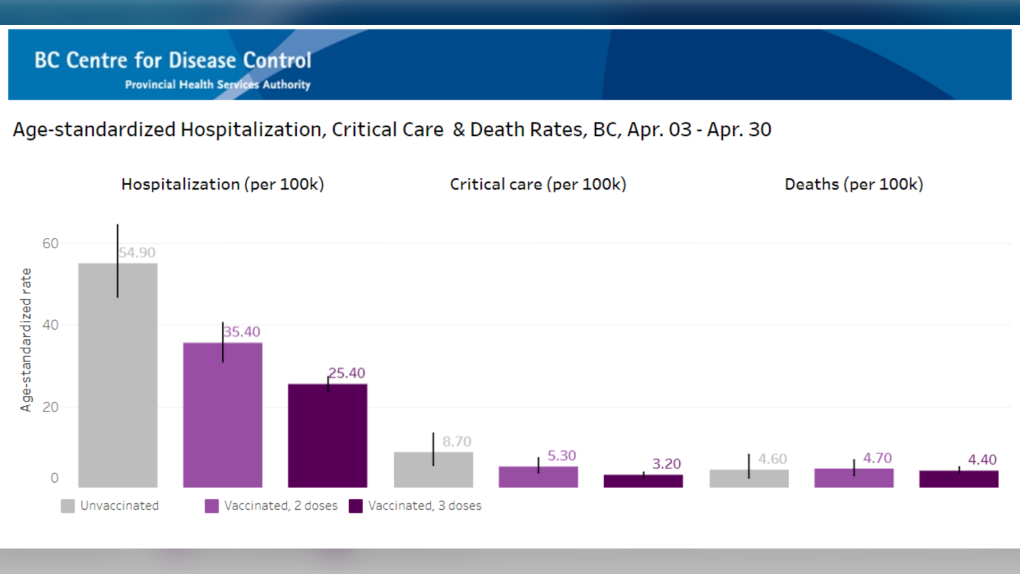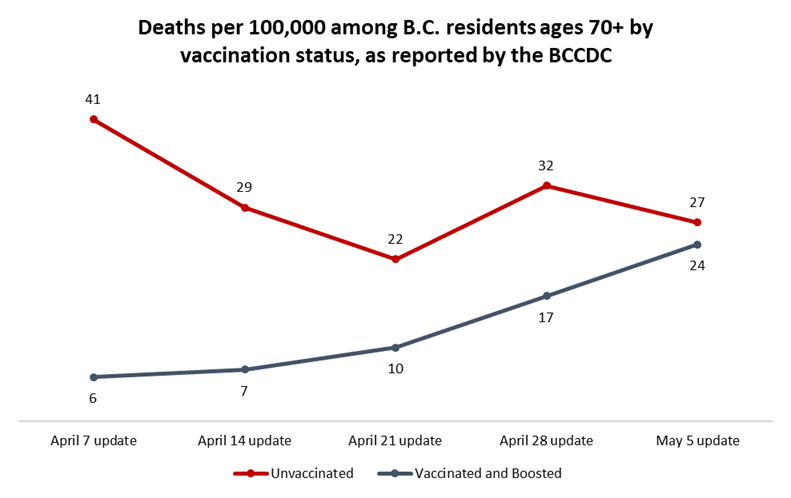B.C.'s new method of counting COVID-19 deaths may be obscuring benefit of vaccination
 A screenshot from the B.C. Centre for Disease Control's COVID-19 Surveillance Dashboard shows little difference in death rates by vaccination status between April 3 and 30. (BCCDC)
A screenshot from the B.C. Centre for Disease Control's COVID-19 Surveillance Dashboard shows little difference in death rates by vaccination status between April 3 and 30. (BCCDC)
While it's long been known that vaccination significantly reduces the likelihood of severe outcomes from COVID-19, B.C.'s recent change to how it reports deaths related to the disease may be making it harder to see that in the data.
On April 2, the province began reporting "30-day, all-cause mortality" in its weekly COVID-19 updates. This means anyone in the province who dies within 30 days of a positive lab test for the coronavirus is reported as a COVID-19 death, regardless of whether the disease actually caused the fatality.
This change appears to be at least partially responsible for recent shifts in the death rates reported on the B.C. Centre for Disease Control's COVID-19 Surveillance Dashboard, which now shows essentially no difference in age-adjusted deaths per 100,000 people across different vaccination statuses.
The Ministry of Health says the data on the dashboard shouldn't be interpreted as an indication of decreased vaccine efficacy.
WHAT THE DATA SAYS
The BCCDC dashboard shows that between April 3 and 30, there were 204 deaths involving people who had tested positive for COVID-19 over the preceding 30 days in B.C.
Of those, 155 - 76 per cent of the total - were people who had received three doses of a COVID-19 vaccine. Another 30 (15 per cent) were people who had received two doses, four (two per cent) were people who had received one dose, and 15 (seven per cent) were people who were unvaccinated.
These raw totals don't account for the significant differences between the populations, however, such as the fact that the triple-vaccinated group is significantly larger and older, on average, than the other groups.
To adjust for these differences, the BCCDC calculates and reports "age-standardized" death rates per 100,000 people for the three largest groups: the unvaccinated, the double-vaccinated and the triple-vaccinated.
For the period in question, after adjusting for age, there were 4.6 deaths per 100,000 unvaccinated people, 4.7 deaths per 100,000 double-vaccinated people and 4.4 deaths per 100,000 triple-vaccinated people.
Compare that to just a few months ago, before the switch to all-cause mortality. Between Jan. 29 and Feb. 25, the age-adjusted death rate among the unvaccinated was 17.7 deaths per 100,000 people, compared to 7.6 per 100,000 among those with two shots and 2.9 per 100,000 among those with three.
The April 3 to 30 data is the first time since the dashboard was launched nearly a year ago that the difference between age-standardized death rates across the different groups has been so small.
It's also the first time that the period covered on the dashboard has included only deaths recorded under the all-cause mortality method.
HOW THE DATA IS LIMITED
The BCCDC maintains that comparisons between deaths reported before the April 2 switch and after it are unreliable.
Despite this, the dashboard – which reports roughly one month's worth of data at a time – continued to report deaths and death rates using a mix of the two systems during the month of April, when the data presented stretched back to dates before April 2.
During that time, CTV News was tracking and calculating death rates among triple-vaccinated and unvaccinated people in the vulnerable 70-plus age group. The analysis found that, as the total number of deaths came to include more weeks in which all-cause mortality was being reported, the difference between the two death rates narrowed significantly.
 As successive updates from the B.C. Centre for Disease Control included more deaths reported after the April 2 switch to all-cause mortality reporting, the death rate among triple-vaccinated B.C. residents ages 70 and older climbed. (CTV)
As successive updates from the B.C. Centre for Disease Control included more deaths reported after the April 2 switch to all-cause mortality reporting, the death rate among triple-vaccinated B.C. residents ages 70 and older climbed. (CTV)
CTV News asked the Ministry of Health how the switch to all-cause mortality could contribute to the flattening of death rates across vaccination groups – both age-adjusted and among those ages 70 and older – given the apparent correlation in the data.
"Ultimately, there are two important things to consider," the ministry said in its response.
"The first is that the overall number of deaths in people age 70 and older are relatively small. While your graphs are correct, when the overall numbers are small, the rates are unstable and are more likely to fluctuate over time."
"The second is that we switched to a new reporting system in early April which makes comparisons between the death data from before April with current data unreliable. In the new system, deaths include any COVID-19 lab positive cases who died from any cause recorded within 30 days of their first positive lab result date. This means the numbers are dependent on testing rates in people aged 70 and older. Testing rates are typically higher for those with three doses of vaccine and there may be other differences across 70-year-olds who have different vaccination status that are not accounted for in the numbers."
VACCINE EFFECTIVENESS
The ministry added that the numbers reported on the dashboard - though they include calculations of outcomes by vaccination status - are not measures of vaccine effectiveness.
"They simply show surveillance data and do not adjust for differences by testing, prior infection, and other important factors that may differ among populations with different vaccination status," the ministry said.
Calculations of vaccine effectiveness in B.C. take these factors into account, and the ministry said updated calculations are on the way.
"Vaccine effectiveness results by age and time since last dose are being finalized and will be shared publicly soon," the ministry said.
"For vaccine effectiveness analyses, we would be limiting analyses to deaths primarily from COVID (rather than all-cause mortality)," it added.
The most recent study of vaccine effectiveness in B.C. looked at the period from September 2021 to February 2022, when Delta and Omicron were the dominant variants in the province.
The summary of that study on the BCCDC website does not mention deaths, but it does conclude that vaccines "provided good protection against severe outcomes," with two doses estimated to prevent 65 to 75 per cent of hospitalizations from Omicron and a booster dose increasing that protection to more than 90 per cent.
CTVNews.ca Top Stories

NEW After hearing thousands of last words, this hospital chaplain has advice for the living
Hospital chaplain J.S. Park opens up about death, grief and hearing thousands of last words, and shares his advice for the living.
BREAKING Police cordon off Iran consulate in Paris where man threatens to blow himself up: French media
French police cordoned off the Iranian consulate in Paris on Friday, where a man was threatening to blow himself up, Europe 1 radio and BFM TV.
Some Canadian families will receive up to $620 per child today
More money will land in the pockets of some Canadian families on Friday for the latest Canada Child Benefit installment.
BREAKING Iran fires at apparent Israeli attack drones near Isfahan air base and nuclear site
An apparent Israeli drone attack on Iran saw troops fire air defences at a major air base and a nuclear site early Friday morning near the central city of Isfahan, an assault coming in retaliation for Tehran's unprecedented drone-and-missile assault on the country.
American millionaire Jonathan Lehrer denied bail after being charged with killing Canadian couple
American millionaire Jonathan Lehrer, one of two men charged in the killings of a Canadian couple in Dominica, has been denied bail.
Ottawa to force banks to call carbon rebate a carbon rebate in direct deposits
Canadian banks that refuse to identify the carbon rebate by name when doing direct deposits are forcing the government to change the law to make them do it, says Environment Minister Steven Guilbeault.
Ontario woman loses $15,000 to fake Walmart job scam
A woman who recently moved to Canada from India was searching for a job when she got caught in an online job scam and lost $15,000.
After COVID, WHO defines disease spread 'through air'
The World Health Organization and around 500 experts have agreed for the first time on what it means for a disease to spread through the air, in a bid to avoid the confusion early in the COVID-19 pandemic that some scientists have said cost lives.
Prince Harry formally confirms he is now a U.S. resident
Prince Harry, the son of King Charles III and fifth in line to the British throne, has formally confirmed he is now a U.S. resident.































